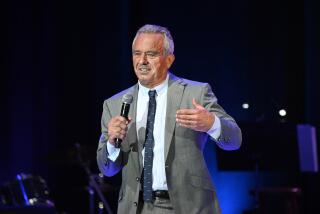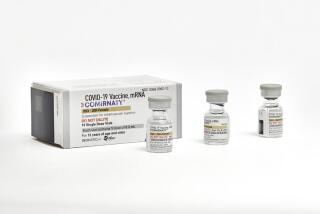Medical Schools Accused of Lack of Leadership
- Share via
Medical schools and teaching hospitals have failed to respond to some of the most pressing public health problems facing the United States, a group of researchers charged today in one of the country’s most widely read medical journals.
Those problems include skyrocketing medical costs, an infant mortality rate worse than that of Hong Kong, a glut of specialists, a dearth of generalists, doctor-caused illnesses and the spread of drug addiction, the group wrote in the Journal of the American Medical Assn.
“I think the public trust is a very complicated and broad trust and that the performance of academic medicine has been uneven,” said Dr. Steven A. Schroeder, an author of the paper and chief of general internal medicine at the UC San Francisco School of Medicine. “In some areas, it has done spectacularly; and in others, it hasn’t paid much attention.”
The article, among the first to emerge from a five-year project aimed at prodding academic medicine to broaden its approach to public health, urged medical leaders to reach beyond mere biomedical research--or risk losing public trust and funding.
Preventive medicine should receive greater priority, the researchers said, adding that public health could be improved dramatically by even small advances in discouraging smoking or encouraging screening for diseases like hypertension and cancer.
Medical school teaching must extend beyond the hospital to nursing homes and patients’ homes, the researchers said, noting that medicine should be practiced there in the future in light of the aging population and changes in health care economics.
“Academic medicine . . . has the opportunity to exert leadership to help our society come to grips with these (social and economic) problems,” Schroeder said in a telephone interview. “ . . . I think, on the whole, the leadership has been lacking.”
Schroeder’s critique, coming at a time of re-evaluation in many medical schools, was received coolly by some in academic medicine. While some conceded a need for a broader focus, they said Schroeder placed unreasonable expectations on their institutions.
Dr. Robert Petersdorf, president of the Assn. of American Medical Colleges, wrote in an accompanying editorial in the journal that academic medicine could not be held accountable for such social ills as infant mortality, teen-age pregnancy and drug abuse.
“Most of what Schroeder suggested I agree with,” Petersdorf said in a telephone interview. “But in many instances there isn’t a hell of a lot that we can do about it.”
“Can we do better? We certainly can, and are trying,” said Dr. Gerard N. Burrow, dean of the UC San Diego School of Medicine. “But can we take responsibility for the ills of society? I think the answer to that is no.”
Schroeder credited the nation’s network of 127 medical schools with many successes in biomedical research, development of technology and progress against heart disease and AIDS.
But the researchers faulted academic medicine for neglecting the current failings of American medicine--for example, an infant mortality rate that ranks 19th in the world amid annual expenditures that amount to 11.4% of the U.S. gross national product.
They traced part of the inflation in health care costs to expensive operations developed and practiced widely at academic medical centers. The use of those procedures at those centers and others makes it difficult to encourage technological or economic restraint, they said.
Other failings that the researchers contend have received inadequate attention from medical leaders included high rates of doctor-induced illness among hospitalized patients, unnecessary use of some lucrative procedures and under-use of medical services by the poor.
More to Read
Sign up for Essential California
The most important California stories and recommendations in your inbox every morning.
You may occasionally receive promotional content from the Los Angeles Times.










